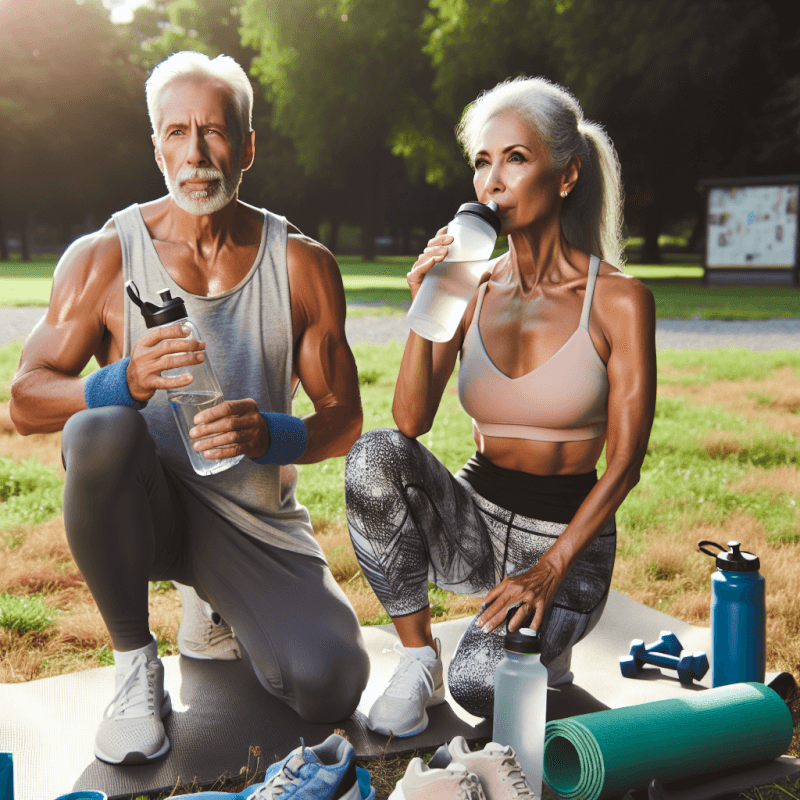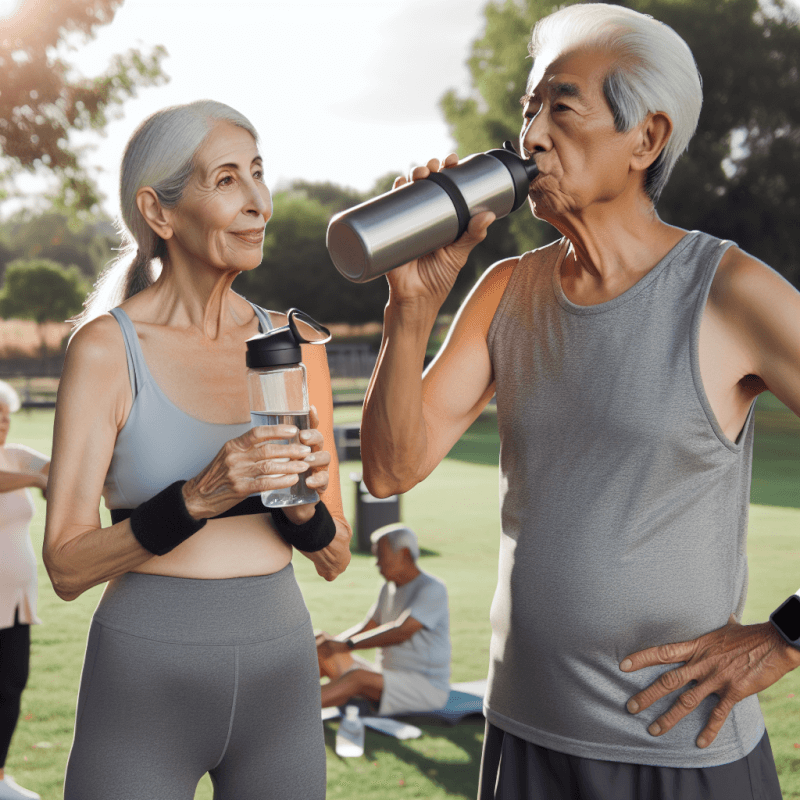Let’s take a moment to examine the crucial role that hydration plays in the overall fitness of older adults. As we age, our bodies become more susceptible to dehydration, which can lead to a myriad of health issues and hinder our ability to maintain a fit and active lifestyle. With this in mind, it becomes essential for older individuals to prioritize their hydration levels, ensuring that they are adequately nourishing their bodies to support optimal physical performance and well-being. In this article, we will explore the importance of hydration in fitness for older adults and delve into some practical strategies to help them stay hydrated and thrive in their fitness journeys.
Importance of Hydration in Fitness
Maintaining Fluid Balance
Hydration is a crucial aspect of fitness, regardless of age. It plays a vital role in maintaining fluid balance within the body. When you exercise, your body loses fluids through sweat, and adequate hydration is essential to replenish those lost fluids. Water is necessary for various bodily functions such as digestion, circulation, and the removal of waste products. By staying properly hydrated, you ensure that your body can function optimally during physical activity.
Supporting Physical Performance
Proper hydration is directly linked to improved physical performance. When you are dehydrated, it can negatively impact your endurance, strength, and overall performance. Dehydration can lead to fatigue, muscle cramps, and decreased mental focus, all of which can hinder your ability to perform at your best. By staying hydrated, you can maintain your energy levels and enhance your physical performance, resulting in a more efficient and effective workout.
Aiding in Nutrient Transport and Recovery
Hydration plays a vital role in nutrient transport and recovery. Water is essential for the digestion, absorption, and transportation of nutrients throughout the body. When you are properly hydrated, nutrients are efficiently delivered to your muscles, helping them recover and repair after exercise. Additionally, staying hydrated can help reduce muscle soreness and promote faster recovery, enabling you to bounce back quickly and continue with your fitness routine.
Regulating Body Temperature
During physical activity, your body temperature rises, and proper hydration is crucial for regulating it. Sweating is your body’s natural cooling mechanism, and water is required for sweat production. By drinking enough fluids, you can help your body maintain a healthy temperature and prevent overheating. It is especially important for older adults, as age-related changes in the body may make it more challenging to regulate body temperature. By prioritizing hydration, you can safeguard yourself against heat-related illnesses and exercise comfortably.

Special Considerations for Older Adults
Age-Related Changes in Hydration
As we age, our bodies go through various changes, including shifts in fluid balance. Older adults tend to have a reduced sense of thirst, which can lead to decreased water intake. Additionally, aging can affect the kidneys’ ability to concentrate urine and retain water, making older adults more prone to dehydration. It is essential for older adults to be aware of these age-related changes and take proactive steps to ensure they are staying properly hydrated.
Increased Risk of Dehydration
Older adults are at a higher risk of dehydration due to various factors. Medications commonly taken by older individuals, such as diuretics, can increase urine output and contribute to fluid loss. Age-related health conditions, including diabetes and kidney disease, can also impact hydration levels. Furthermore, older adults may have reduced mobility or cognitive impairments that hinder their ability to access water or remember to drink enough fluids. It is crucial for older adults to recognize these increased risks and prioritize hydration to maintain their overall health and well-being.
Effects of Dehydration on Older Adults
Dehydration can have severe consequences for older adults. It can lead to an increased risk of urinary tract infections, constipation, confusion, and even hospitalization. Dehydration can exacerbate existing health conditions and impair cognitive function, making everyday activities more challenging. It is crucial for older adults to be aware of the potential effects of dehydration and take the necessary steps to prevent it.

Hydration Guidelines for Older Adults
Recommended Daily Water Intake
To ensure adequate hydration, older adults should follow specific guidelines for daily water intake. The National Academies of Sciences, Engineering, and Medicine recommend that men over 50 should consume approximately 3.7 liters (about 13 cups) of total water per day, while women over 50 should aim for 2.7 liters (about 9 cups) of total water per day. These recommendations include fluids from all sources, including beverages and food with high water content.
Sources of Hydration
It’s important for older adults to consider various sources of hydration to meet their daily water intake goals. While water is an excellent choice, other beverages such as herbal tea, decaffeinated coffee, and milk can contribute to hydration. Fruits and vegetables with high water content, such as watermelon, cucumbers, and citrus fruits, can also help meet hydration needs. It’s essential for older adults to incorporate a variety of hydrating options into their daily routine to ensure proper hydration.
Signs of Dehydration in Older Adults
Older adults should be aware of the signs of dehydration to take prompt action if necessary. Common signs of dehydration include increased thirst, dry mouth, dark yellow urine, fatigue, dizziness, and confusion. Monitoring these symptoms can help older adults identify when they may need to increase their fluid intake or seek medical attention if severe dehydration is suspected. It’s essential to stay vigilant and address dehydration promptly to prevent further complications.

Hydration Strategies for Fitness
Pre-Workout Hydration
Before engaging in any fitness activity, it is crucial to prioritize pre-workout hydration. Aim to drink around 16-20 ounces of water 2-3 hours before exercise and an additional 8-10 ounces 10-20 minutes before starting. This will ensure adequate hydration before you begin sweating and help maintain fluid balance throughout your workout. Additionally, consider consuming a small snack that contains both carbohydrates and electrolytes to provide your body with the necessary fuel and aid in hydration.
During-Workout Hydration
During your workout, it’s vital to maintain hydration to replace the fluids lost through sweat. The American College of Sports Medicine recommends consuming 7-10 ounces of water every 10-20 minutes during exercise. However, the exact amount may vary depending on factors such as the intensity and duration of your workout, as well as individual sweat rates. Consider using a sports drink that contains electrolytes if you engage in prolonged or intense exercise sessions to replenish both fluids and essential minerals.
Post-Workout Hydration
After completing your workout, don’t forget to replenish fluids to support recovery. Aim to drink at least 16-24 ounces of water for every pound of body weight lost during exercise. Additionally, consider consuming a post-workout snack or meal that includes a combination of carbohydrates and protein to aid in muscle repair and glycogen replenishment. Prioritizing post-workout hydration will ensure proper recovery and allow your body to bounce back effectively for your next exercise session.

Hydration Tips for Older Adults
Drink Water Regularly
Older adults should make a conscious effort to drink water regularly throughout the day. Set a schedule or use reminders to ensure you are staying hydrated consistently. Keep a water bottle within reach and take regular sips to maintain hydration levels. Over time, developing a habit of drinking water regularly will become second nature, helping you meet your daily hydration needs.
Monitor Urine Color
One simple way for older adults to assess their hydration status is by monitoring their urine color. Clear or pale yellow urine is a good indicator of adequate hydration, while dark yellow or amber-colored urine may indicate dehydration. Paying attention to urine color can help you gauge whether you need to increase your fluid intake or seek medical attention if dehydration is suspected.
Stay Hydrated throughout the Day
Don’t limit hydration solely to your workout or meal times. Older adults should aim to stay hydrated throughout the day by consuming fluids regularly. Make it a habit to drink water with each meal and snack, and consider incorporating hydrating foods into your diet such as soups, smoothies, and fruits. By spreading your hydration intake throughout the day, you can maintain a steady fluid balance and avoid dehydration.
Consider Electrolyte Balance
Electrolytes, such as sodium, potassium, and magnesium, play a crucial role in maintaining proper hydration. Older adults should consider their electrolyte balance and ensure they are adequately replenishing these minerals. Consuming foods that are rich in electrolytes, such as bananas, leafy greens, and nuts, can help support hydration and overall health. If engaging in prolonged or intense exercise, consider sports drinks or electrolyte supplements to replace these essential minerals.

Conclusion
Hydration is of utmost importance in fitness for older adults. By maintaining fluid balance, supporting physical performance, aiding in nutrient transport and recovery, and regulating body temperature, hydration plays a significant role in overall well-being. Older adults should be mindful of age-related changes in hydration, the increased risk of dehydration, and the potential effects of dehydration on their health. Following hydration guidelines, incorporating hydration strategies for fitness, and implementing specific hydration tips can help older adults prioritize and maintain proper hydration levels. By doing so, they can optimize their fitness journey, promote overall health, and enjoy an active and fulfilling lifestyle for years to come.


